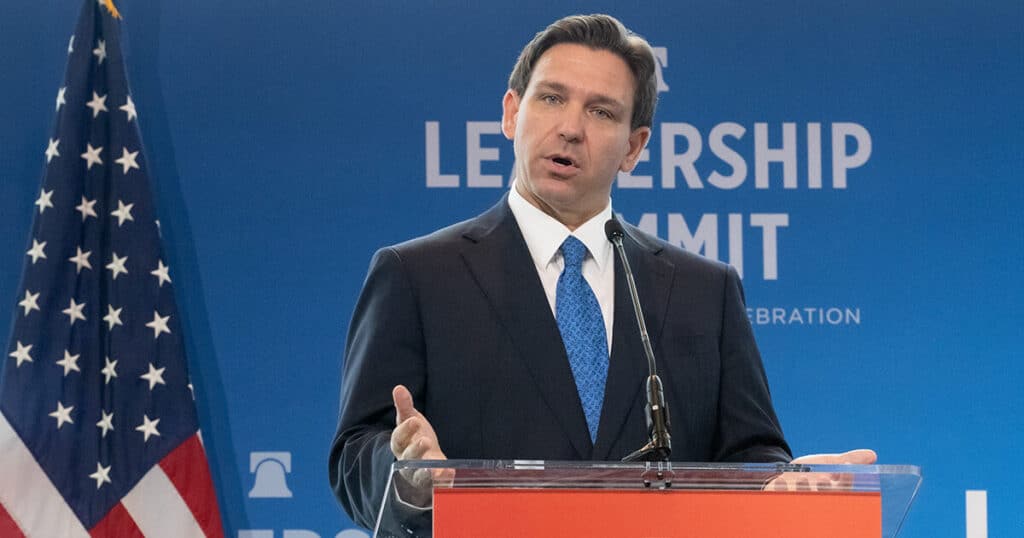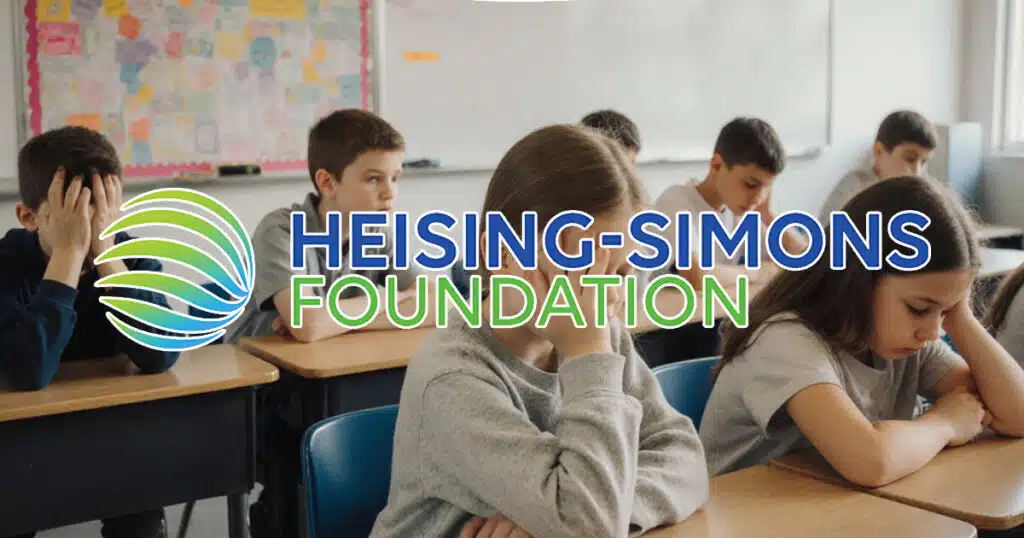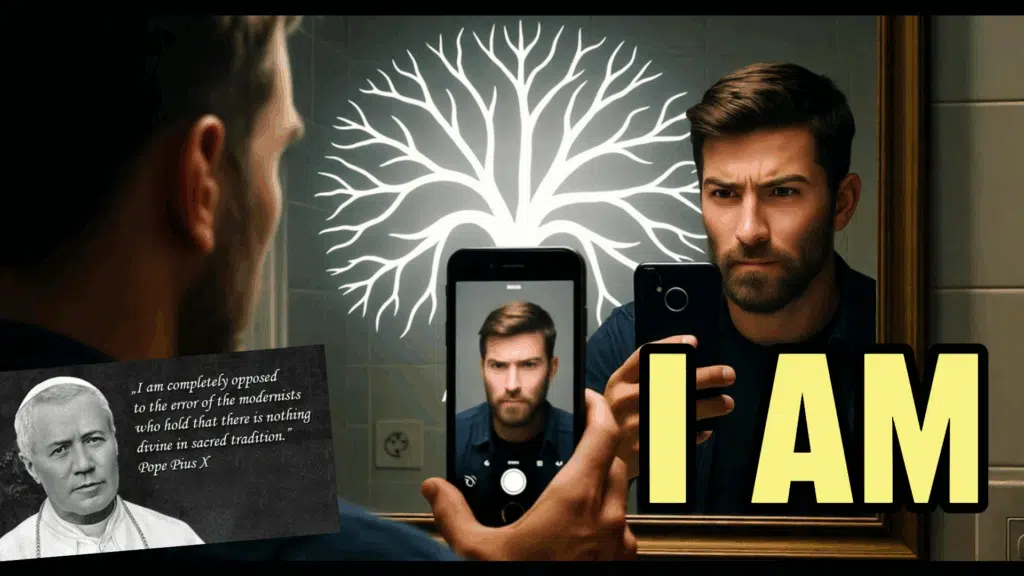
DeSantis Signs 4 of Largest Reforms of Public Education in Florida History
Florida Gov. Ron DeSantis, a Republican, signed four landmark pieces of education legislation Tuesday that seek to “empower teachers,” protect schools from the harmful effects of social media, expand student scholarships, and authorize one standardized test as an alternative to two others.
DeSantis’ office has dubbed the package of four bills the “Teachers Bill of Rights,” saying they contain some of the largest reforms to public education since the school choice wave that began in Florida in 1996.
In one significant change, Florida will become the first state to allow use of the Classical Learning Test, or CLT, as an alternative to the Scholastic Aptitude Test or the American College Testing exam to determine whether students qualify to graduate.
SB 256, one of the bills signed by the governor, focuses on “paycheck protection.” This includes prohibiting teachers unions from deducting union dues directly from teachers’ paychecks. Florida joins other states, such as Indiana, that already have taken such a step to prevent teachers unions from sneaking thousands of dollars a year out of teachers’ pockets with such incremental paycheck deductions.
SB 256 also requires annual audits and financial disclosures for all teachers unions, both local and national affiliates, operating in Florida. The Florida Attorney General’s Office will be required to investigate suspected union fraud.
Teachers unions in Florida will be banned from parlaying with school boards in backroom deals at taxpayers’ and teachers’ expense.
In perhaps the biggest change of SB 256, teachers unions now must garner a membership of at least 60% of a school district’s faculty to remain recognized by the district or to engage in collective bargaining on behalf of members.
Another bill signed by DeSantis, HB 1537, rolls back regulations that have been accused of stunting growth in Florida’s education sector for decades. Temporary teaching certificates will be good for five years rather than three, and all levels of certification will have fewer “unnecessary bureaucratic requirements.”
Specifically, teachers have new pathways to maintain and renew their certifications. This will begin Florida’s disentanglement from deeply out-of-date professional development requirements that have eaten up thousands of hours of teachers’ time with little to show in gained skill or methodology.
Concerning teacher training, HB 1537 also allows “aspiring teachers” to apply for temporary certification if they hold professional skill in other but related fields—even if those aspiring teachers aren’t members of teacher education programs on the university level.
In a monumental shift, Florida is now the first state to authorize the Classical Learning Test for students to qualify for graduation and to earn one of the state’s Bright Futures scholarships. The CLT is an alternative assessment for high school students that focuses on evaluating “English, grammar, and mathematical skills, providing a comprehensive measure of achievement and aptitude.”
Many universities have begun adding the CLT to their standardized testing choices.
Heritage Foundation President Kevin Roberts, whose background is in education, points out: “More than 200 private colleges and universities accept the CLT, and Florida’s fastest growing Catholic university, Ave Maria University, recently made it the school’s ‘preferred’ college entrance exam for applicants.”
The College Board, which creates and administers the SAT and high school Advanced Placement courses, has received heavy criticism in recent years both for changing content on exams and including racially divisive, historically inaccurate, and unscientific material.
This, as well as the booming growth in classical education via charter, private, and homeschooling, has driven the CLT to national prominence in the past five years.
Including the CLT as an option for high school students to graduate could be a step toward giving students of diverse learning backgrounds a choice to focus on more “tried and true” subjects of study.
CLT founder Jeremy Wayne Tate told The Daily Signal:
“It is difficult to exaggerate the importance of standardized testing. In addition to providing insight into where a student is at academically, the content of this test has a profound influence in shaping curriculum. I could not be more excited that Florida has made this move. We expect at least three more states [to do so] next year.”
DeSantis also signed HB 477, which reduces term limits for Florida’s public school boards from 12 to eight years. This change, according to the governor’s office, brings school boards into line with the term limits set for Florida’s governor, the governor’s Cabinet members, and the Florida Legislature.
In another landmark action, the Legislature approved House Joint Resolution 31, which will put forward a referendum to return the state’s public school boards to a partisan election system in which candidates may identify themselves as Republicans, Democrats, or members of another party. The change would make Florida the fifth state to allow openly partisan elections for school boards.
The fourth bill signed by DeSantis, HB 379, focuses on taking social media out of Florida’s public education system altogether. It requires public school districts to “prevent students from connecting to social media sites on district-owned computers and servers,” as well as prohibits TikTok, a Chinese-owned social media program, to be accessed on district devices.
HB 379 gives teachers increased authority to establish their own rules, free of administration intervention, for students’ cell phone use in their classroom.
So far, responses from both legacy media and teachers unions have been interesting, to say the least.
An Associated Press headline accuses DeSantis of “taking aim” with the new laws at a teachers union that previously had “defied” him, although no specific teachers union is mentioned in any of the bills signed by the governor.
NBC affiliate WFLA-8 of Tampa, Florida, vaguely accuses DeSantis of “easing graduation requirements,” though reporter Trevor Sochocki doesn’t specify how the bills he signed would ease any graduation requirements whatsoever.
Andrew Spar, president of the Florida Education Association, the state’s largest teachers union, released a written statement in which he claimed: “This new law grossly oversteps in trying to silence teachers, staff, professors and most other public employees. We will not go quietly—our students and our professions are simply too important.”
The headline on Politico reporter Andrew Atterbury’s story says the governor’s “beef with the College Board” resulted in Florida’s wanting “its own tests.” However, the CLT doesn’t come from Florida, nor does it mention any option specific to Florida. (The CLT was founded in 2015, preceding the DeSantis administration.)
The Florida Legislature and DeSantis have done something rather unique with the past few months of education legislation: They have put years of theories and dreams from education reformers into practice. Providing greater freedom to Florida’s students and teachers showcases a state focused on improving its education system by expanding access to the largest American innovators: agency and liberty.
Now we look forward to the results.



